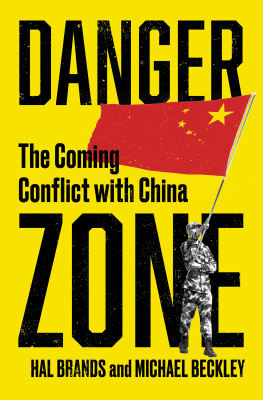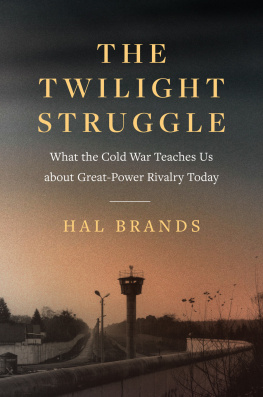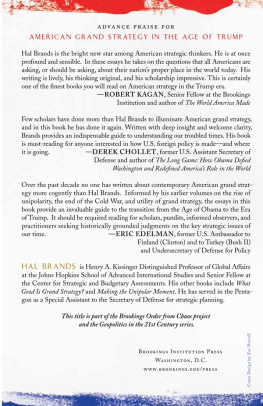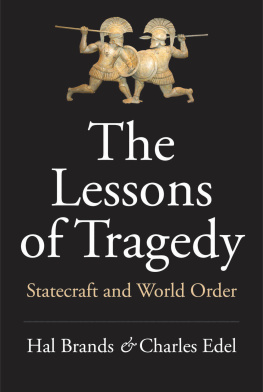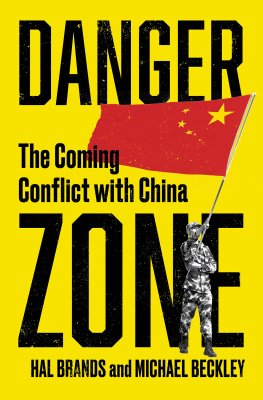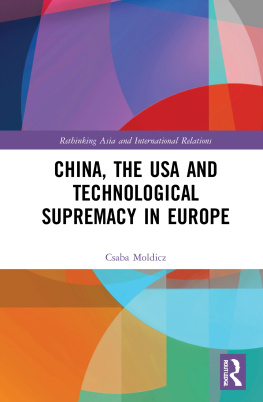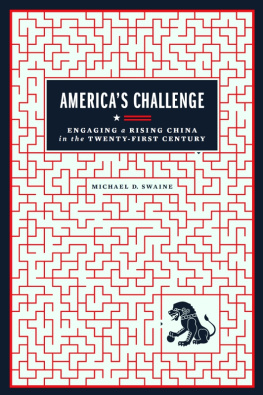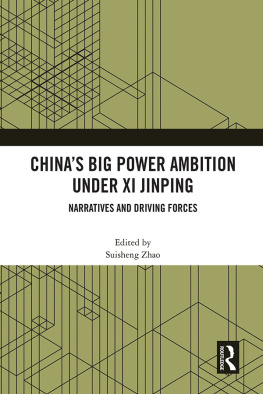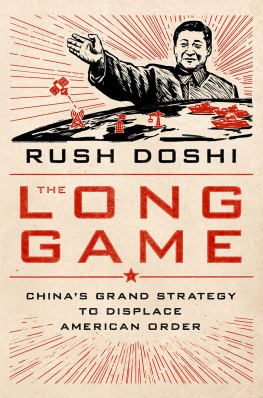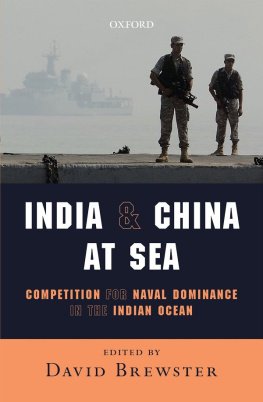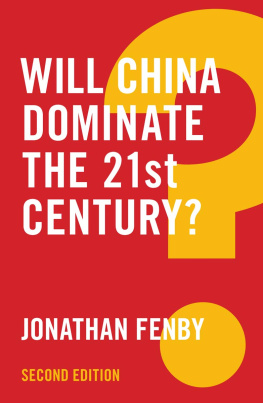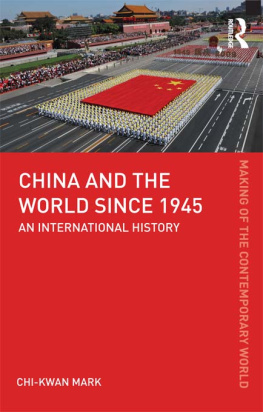
DANGER
ZONE
The Coming Conflict with China

HAL BRANDS
and
MICHAEL BECKLEY

W.W. NORTON & COMPANY
Independent Publishers Since 1923
For our families
DANGER ZONE
T he greatest geopolitical catastrophes occur at the intersection of ambition and desperation. Xi Jinpings China will soon be driven by plenty of both.
Well explain the cause of that desperationa slowing economy and a creeping sense of encirclement and decline. But first, we need to lay out the grandness of those ambitionswhat Xis China is trying to achieve. It is difficult to grasp just how hard Chinas fall will be without understanding the heights to which Beijing aims to climb. And those heights are imposing, because the Chinese Communist Party is undertaking an epic project to rewrite the rules of global order in Asia and far beyond. China doesnt want to be a superpowerone pole of many in the international system. It wants to be the superpowerthe geopolitical sun around which the system revolves.
Xi announced as much in October 2017, albeit in the opaque language that revisionist powers often use to obscure their intentions. The occasion was the Nineteenth Congress of the Chinese Communist Party, a quinquennial conclave that Chinas rulers use to tout their achievements and preview their plans. Xi had already made this congress memorable by enshrining Xi Jinping Thought in Chinas constitution, sidelining potential successors, and cementing his status as the countrys most dominant leader since Mao Zedong. And as Xi consolidated power at home, he hintedin a marathon speech lasting more than three hoursthat Beijing was ready to shake up the balance of power abroad.
Under CCP leadership, Xi declared, China has stood up, grown rich, and is becoming strong. A country that the West had once hoped would follow its democratic example was now blazing a new trail for other developing countries to follow. Beijing was already moving closer to center stage in world affairs. By the 100-year anniversary of the Peoples Republic in 2049, China would become a global leader in composite national strength and international influence; it would build a more stable world order in which Chinas national rejuvenation could be fully achieved.
Xis words might have seemed anodyne to the untrained observer. But his audience of Communist Party apparatchiks would have understood what they were hearinga statement that China was now a great power capable of mounting a global challenge to the United States. Xi himself had put it bluntly in a less publicized speech years earlier. The road ahead would be hard, he explained, and traveling it would require great strategic determination. Yet the destination was not in doubt: China would build a socialism that is superior to capitalism and ensure a future where we will win the initiative and have the dominant position.
That ambition is now hard to miss in what CCP officials are saying. It is even more obvious in what the CCP is doing, from its world-beating naval shipbuilding program to its effort to remake the strategic geography of Eurasia. Chinas grand strategy involves pursuing objectives close to home, such as cementing the CCPs hold on power and reclaiming bits of China that were ripped away when the country was weak. It also includes more expansive goals, such as carving out a regional sphere of influence and contesting American power on a global scale. The CCPs agenda blends a sense of Chinas historical destiny with an emphasis on modern, twenty-first century tools of power. It is rooted in the timeless geopolitical ambitions that motivate so many great powers and the insatiable insecurities that plague Chinas authoritarian regime.
Although Chinas drive to reorder the world predates Xi Jinping, it has accelerated dramatically in recent years. Today, CCP officials outwardly evince every confidence that a rising China is eclipsing a declining America. Inwardly, however, Beijings leaders are already worrying that the Chinese dream may remain just that.
WHAT CHINA WANTS
Discerning what China wants can be tricky, because countries that want to overturn the status quo have every reason to conceal their goals. The CCP, moreover, is a secretive authoritarian party that feels no compunction about deceiving outsiders or even its own people. As a result, Chinas grand strategythe countrys overarching conception of what it is trying to achieveis typically found more in a rough consensus among elites than in detailed, step-by-step plans for the future. Yet if one looks closely enough, there is ample evidence that the CCP is pursuing a determined, multilayered grand strategy with four key objectives.
That the CCP is in position to seek any of these objectives is a tribute to the greatest change in global politics during the past half-centuryChinas emergence as a major power. At its creation in 1949, the Peoples Republic was a technologically backward, poverty-ridden All of which means that Chinas leaders can entertain some very big dreams.
First, the CCP has the eternal ambition of every autocratic regimeto maintain its iron grip on power. China is not what Americans would consider a normal state that hashes out its national interests through open argument and elections. China has political debates, but they occur exclusively within a one-party state in which the supremacy of the CCP is written into the constitution. Since 1949, the Chinese regime has always seen itself as being locked in struggle with domestic and foreign enemies. Its leaders are haunted by the Soviet collapse, which brought down another great socialist state. They know that the collapse of the CCP-led system would be a disaster, and probably fatal, for them personally. The resulting zero-sum ethos, one Sinologist writes, is captured in the stark formula, You-Die, I-Live.
In Chinese politics, paranoia is a virtue rather than a vice. As Wen Jiabao, then Chinas head of government, once said, To think about why danger looms will ensure ones security. To think about why chaos occurs will ensure ones peace. To think about why a country falls will ensure ones survival.
Second, the CCP wants to make China whole again by regaining territories lost in earlier eras of internal upheaval and foreign aggression. This goal, too, dates back decades: The CCP seized and annexed Tibet just after it took power in China. Today, Xis map of China includes a Hong Kong that is completely reincorporated into the CCP-led state (a process that is virtually complete) and a Taiwan that has been brought back into the PRCs grasp. That self-governing islands anomalous status cannot be passed on from generation to generation, Xi has said: Beijing cannot wait forever for its renegade province to return.
Elsewhere along its periphery, the CCP has outstanding border disputes with countries from India to Japan. Beijing also claims some 90 percent of the South China Seaone of the worlds most commercially vital waterwaysas its sovereign possession. Chinese officials say that there is no room for compromise on these issues. We cannot lose even one inch of the territory left behind by our ancestors, Xi told U.S. secretary of defense James Mattis in 2018, generously adding, What is other peoples we do not want at all.
Because Chinas claims in the East and South China Seas reach hundreds of miles from its borders, it can be hard to differentiate these sovereignty issues from a larger campaign to achieve mastery in East Asia. The CCPs third objective is to create Asia for Asians, a regional sphere of influence in which China is supreme because outside actors, especially America, are pushed to the margins.
Next page
